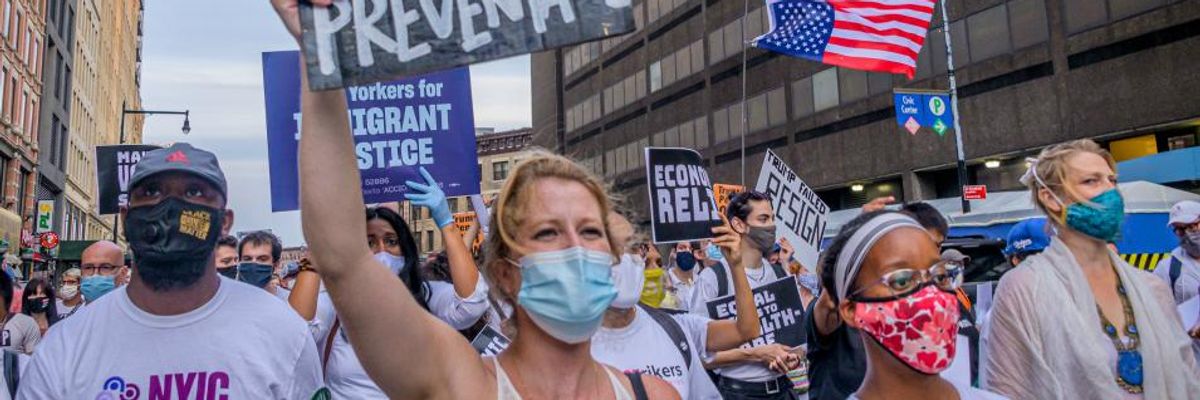As new Labor Department figures released Thursday morning confirmed mass layoffs continue at an unprecedented rate due to inaction from Congress and the ongoing pandemic, Democratic lawmakers and progressive advocacy groups ripped Senate Republicans for putting forth a woefully inadequate relief proposal that would neither restore the $600-per-week federal unemployment boost nor provide any funding for rental assistance.
The GOP's so-called "skinny" proposal--which Senate Minority Leader Chuck Schumer (D-N.Y.) said should more accurately be described as "emaciated"--is, however, expected to propose sweeping liability protections for corporations that expose their workers and customers to Covid-19, a top priority of Senate Majority Leader Mitch McConnell (R-Ky.) that is widely opposed by consumer advocates and small businesses.
"Republicans may call their Covid-relief proposal 'skinny,' but it'd be more appropriate to call it 'emaciated.' Their proposal appears to be completely inadequate and fails to meet the country's needs."
--Senate Minority Leader Chuck Schumer
Senate Republicans are reportedly planning to unveil their legislation by the end of the week and hold a vote after Labor Day.
Kyle Herrig, president of watchdog group Accountable.US, said in a statement that "after weeks on taxpayer-paid vacation, Trump's Senate allies are returning to work to find a recession and health crisis in even worse shape than they left it."
"The best they could come up with in that time amounts to a band-aid as the economy continues to hemorrhage jobs--including deep cuts to unemployment benefits, no stimulus checks or serious housing aid, and more of the same mismanaged [Paycheck Protection Program] that abandoned communities of color," said Herrig. "Senators are under the mistaken impression that their 'skinny' bill will give them cover to continue shrugging off their responsibility."
According to Politico, which obtained a draft of the GOP plan, the legislation is expected to propose a $300-per-week federal unemployment supplement--just half of the $600 boost Republicans let expire at the end of July--a liability shield for businesses, $105 billion for schools, and additional funding for small businesses.
Politico reported that the bill will also propose direct funding for the U.S. Postal Service by converting an existing $10 billion loan into a grant--far less relief than the $25 billion in emergency funds that House Democrats approved late last month. The total price tag of the Republican stimulus package is expected to be somewhere between $500 and $700 billion, making the bill significantly smaller than the $1 trillion plan the GOP unveiled in late July.
In a Dear Colleague letter (pdf) on Thursday, Schumer slammed his Republican counterparts for "moving even further in the wrong direction" by offering a stimulus plan that "appears to be completely inadequate and, by every measure, fails to meet the needs of the American people."
The New York Democrat went on to accuse the GOP of merely "trying to 'check the box' and give the appearance of action rather than actually meet the truly profound needs of the American people."
"With no money for rental assistance, no money for nutrition assistance, and no money for state and local services, the census, or safe elections," said Schumer, "Leader McConnell and Senate Republicans would be making another unacceptable and ineffective attempt at providing relief."
Criticism of the GOP's latest meager Covid-19 proposal comes as relief talks between Democratic leaders and the Trump White House remain stalled even as the nation's economic conditions continue to deteriorate, leaving tens of millions of jobless, hungry, and eviction-prone Americans without desperately needed financial assistance.
More than 100 days ago, the Democrat-controlled House passed a $3 trillion bill that would extend the $600-per-week federal unemployment boost through January of next year, provide another one-time $1,200 stimulus payment to struggling Americans, and approve federal aid to cash-strapped states, among other solutions.
McConnell has refused to allow a Senate vote on the legislation, which he dismissed as an "unserious liberal wish list."
Department of Labor statistics released Thursday showed that 1.6 million workers applied for unemployment insurance last week, an increase from the previous week. Heidi Shierholz, senior economist and director of policy, noted in a blog post Thursday that the new figures mark "the 24th week in a row total initial claims were far greater than the worst week of the Great Recession."
"Congress must act, but Republicans in the Senate are blocking progress," wrote Shierholz. "Blocking the $600 [federal unemployment boost] is terrible on both humanitarian and economic grounds. The extra $600 was supporting a huge amount of spending by people who now have to make drastic cuts. The spending made possible by the $600 was supporting 5.1 million jobs. Cutting that $600 means cutting those jobs."
"The Senate must come back from vacation and extend the UI provisions of the CARES Act," Shierholz added, "both to provide relief to the jobless and to the bolster the broader economy."

